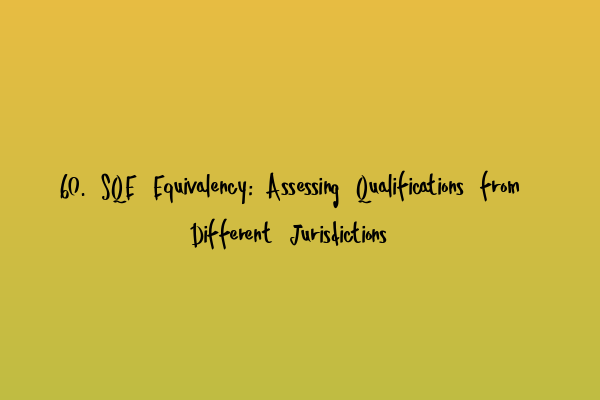60. SQE Equivalency: Assessing Qualifications from Different Jurisdictions
As the legal industry becomes increasingly globalized, it is crucial for solicitors to understand and navigate the complexities of assessing qualifications from different jurisdictions. The introduction of the Solicitors Qualifying Examination (SQE) provides a standardized framework for assessing the competence of aspiring solicitors, but it also raises questions about how qualifications from other jurisdictions fit into this new system.
In this article, we will explore the concept of SQE equivalency and discuss the challenges and considerations involved in assessing qualifications from different jurisdictions. We will also provide insights and expert advice on how to approach this process effectively.
The Importance of SQE Equivalency
SQE equivalency plays a vital role in ensuring that individuals with legal qualifications from overseas jurisdictions are given fair and appropriate recognition within the UK legal system. It allows for a streamlined assessment process that takes into account the knowledge, skills, and experience gained in other jurisdictions.
By recognizing and assessing qualifications from different jurisdictions, the legal profession can benefit from the diverse perspectives, expertise, and experiences that lawyers from around the world bring to the table. It promotes inclusivity, enhances collaboration, and improves the overall quality of legal services.
Challenges and Considerations
Assessing qualifications from different jurisdictions is not without its challenges. Each jurisdiction has its own legal education system, with varying degrees of depth and breadth in specific areas of law. It can be difficult to determine the extent to which a qualification from another jurisdiction aligns with the knowledge and skills required for qualification as a solicitor in the UK.
Some of the key considerations when assessing qualifications from different jurisdictions include:
- Comparing the content and scope of the qualification with the SRA syllabus for the SQE
- Evaluating the depth and rigor of the education and training program
- Assessing the practical experience gained and its relevance to the UK legal system
- Considering the reputation and accreditation of the institution providing the qualification
It is important to approach the assessment process with an open mind and a willingness to recognize the value of qualifications gained in other jurisdictions. This can be achieved through a thorough evaluation process that takes into account both the similarities and differences between the qualification and the requirements of the SQE.
Expert Insights and Advice
To gain a deeper understanding of SQE equivalency and how it applies to qualifications from different jurisdictions, we reached out to our panel of legal experts. Here are some insights and advice they shared:
- Consider SQE webinars: Our webinar series offers expert insights into various aspects of the SQE, including the assessment of qualifications from different jurisdictions. These webinars provide invaluable guidance to aspiring solicitors and professionals seeking to understand the intricacies of the SQE equivalency process. For more information, check out our SQE webinars.
- Review SQE course providers: Choosing a reputable and trusted SQE course provider can greatly assist individuals with qualifications from different jurisdictions. Our article on SQE course providers offers insights and recommendations based on in-depth research and expert opinions.
- Understand the SRA syllabus: Familiarize yourself with the SRA syllabus for the SQE to gain a clear understanding of the knowledge and skills that are required for qualification as a solicitor in the UK. Our article on the SRA syllabus for the SQE provides a comprehensive overview of the key topics and areas of law covered.
- Seek insider tips and study tricks: Our article on insider tips and study tricks provides valuable advice from experienced solicitors who have successfully navigated the SQE.
- Understand the grading system: Take the time to understand how exams are evaluated and graded in the SQE. Our article on the grading system in the SQE offers insights into how exam performance is assessed and provides guidance on how to maximize your chances of success.
Conclusion
Assessing qualifications from different jurisdictions is a complex process that requires a careful evaluation of knowledge, skills, and experience gained in other legal systems. SQE equivalency provides a framework for ensuring fair recognition of qualifications and promoting inclusivity within the legal profession.
By understanding the challenges and considerations involved in assessing qualifications from different jurisdictions, and by leveraging the insights and advice of legal experts, aspiring solicitors can navigate this process effectively and enhance their chances of success.
For more information and guidance on SQE equivalency, please explore our website or reach out to our team of experts.
